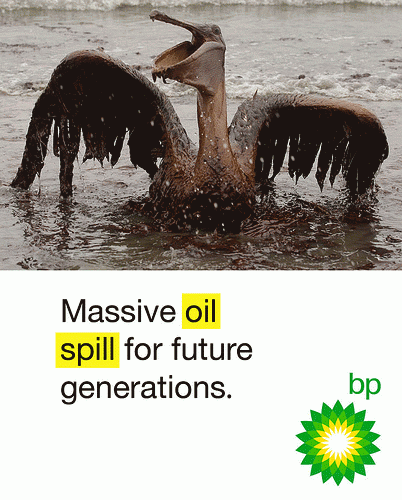| Back OpEdNews | |||||||
|
Original Content at https://www.opednews.com/articles/A-Bidding-War-For-Recover-by-Jeffrey-Toney-100612-712.html (Note: You can view every article as one long page if you sign up as an Advocate Member, or higher). |
|||||||
June 12, 2010
"A Bidding War For Recovered BP Oil: Why Not A Carrot Instead Of A Stick?"
By Jeffrey Toney
Let's consider how to make it profitable for environmental recovery after disasters such as the BP oil Gulf spill!
::::::::
Everyday we awaken to more disheartening news about the BP oil spill. BP executives attempt to appear sympathetic about this disaster, saying that they will "make it right". A common theme is emerging: initially, BP executives describe things in the most positive light, stating "minimal effect on the environment" and later: "Now that the cap is in place, a trickle of oil remains"".
Then external observers, including scientists and engineers, provide a very different assessment. The initial flow rate was far more than that initially described by BP, and the amount of oil "trickling" from the cap is hardly a trickle more akin to periodic geysers.
Blame is being assigned broadly, to BP itself to federal regulators to President Obama. The "$75 million liability limit" has been given much attention; now it is recognized that liability and damages will likely be in the billion dollar range.
BP's CEO has indicated that they will pay investors well over $10 billion this year in dividends for shares in the company, so a $1 billion penalty would be a relative "slap on the wrist" in response to this environmental disaster.
I keep thinking about the oil that has been recovered from the spill and how much can be recovered in the future. BP has reported that 14,800 barrels were recovered on June 7, and that proceeds from the sale of the captured oil will be donated to a new wildlife fund. This gesture may be well intentioned, but the impact will likely be minimal. At $72 per barrel, the recovered oil on June 7 represents a bit over $1.0 million.
Corporations must be profit-driven in order to survive and thrive, to be able to reward their investors and they must evolve to respond to changing markets and consumer needs. Instead of using a "stick" as a response to this disaster, why not use a "carrot"? In my opinion, this recovered oil is the most valuable oil in the world. If released into the environment, the cost is far beyond financial value; the dispersed oil taxes our future through lost jobs, public health risks and unborn wildlife. If BP viewed recovery of this oil as a means towards increasing profits, it is likely that they will invest more resources into efficient recovery and in accomplishing the recovery as quickly as possible.
As a consumer, how much would you pay for the recovered oil? Perhaps this precious commodity could be offered for bidding to the highest payer. Imagine a bidding war amongst the world's most wealthy individuals, with the prize being to not only claim that you are driving the recovery of the environment in the Gulf, but are a major player in driving profits of BP itself and the petroleum industry. Ultimately, BP could use these additional profits to support environmental preservation and research into alternative renewal energy sources. Yes, BP does invest in alternative fuels, but use of these profits would have special significance.
This approach may seem radical, but our economy is replete with examples of highly sought-after commodities garnering huge profits. We know that commodities can have a vast range of value, depending upon availability and emotion of the buyer. Consider unique pieces of art, that highly rated bottle of wine from a bygone era, that collectible automobile. The oil from a land-locked safely secured well may be considered as a "two buck Chuck" bottle of wine, but recovered oil from the BP spill is comparatively a $2,000 bottle of Mouton Rothschild.
Who would like to make the opening bid?
Authors Bio:
Jeffrey H. Toney is Dean of the College of Natural, Applied and Health Sciences at Kean University and is a Trusted Author at OpEdNews. He received a B.S. in Chemistry at the University of Virginia and an M.S. and Ph.D. in Chemistry at Northwestern University. He served as a postdoctoral fellow in Molecular Biology at the Dana Farber Cancer Institute at Harvard Medical School and in Chemical Biology at the Massachusetts Institute of Technology. He has held the Herman and Margaret Sokol Professorship in Chemistry at Montclair State University and served as Department Chairperson of Chemistry and Biochemistry. His current scholarship is focused on drug discovery and bridging science and human rights. He has currently published 60 peer reviewed scientific articles and holds six U.S. patents. He has recently published in Science, The New York Times, The Star Ledger and he is a regular blogger on NJ Voices, the online opinion website of The Star Ledger.
